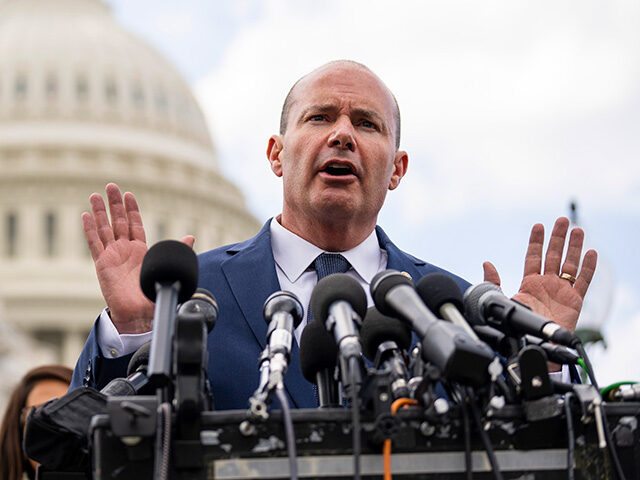Sen. Mike Lee (R-UT) told Breitbart News in an exclusive statement that the House Intelligence Committee’s proposed reforms are “mere window dressing” and may even expand government surveillance programs.
The House Intelligence is reportedly circulating details about how to reform Section 702 of the Foreign Intelligence Surveillance Act (FISA), a controversial government surveillance program.
Section 702 is a law that allows intelligence agencies to collect communications of targeted foreigners. It also may lead to targeted surveillance of Americans’ private communications, which privacy advocates consider a run around the Fourth Amendment’s requirement for a warrant to search Americans’ communications.
Section 702 will expire at the end of the year, setting up a high-stakes battle between privacy-oriented lawmakers and those sympathetic to the intelligence agencies.
Politico obtained the memo about the proposal, which would introduce modest reforms to the program:
In a notable shift for Intelligence Committee members, who are generally more closely aligned with the community they oversee, the panel will require a warrant for a subset of searches for Americans’ information swept in under 702. The panel’s bill would require a warrant for “evidence of a crime” searches, which are not related to foreign intelligence. The administration has signaled privately and publicly for months that it is opposed to any warrant requirement, arguing that it would undermine the effectiveness of the program.
The Intelligence Committee’s proposal isn’t yet finalized. But the talking point details are far narrower than those in a bipartisan, bicameral bill privacy hawks rolled out last week that would require a warrant for any U.S. person searches. The scope of a warrant requirement is expected to be the most contentious issue in the upcoming debate, and Republicans are predicting it will need to be hashed out on the House floor.
The document does not provide details on who would carry out the bill’s “independent audits.” It also does not include legislation that would prevent data brokers from selling consumer data to federal law enforcement, which has been derided as a “deliberate” run around the Fourth Amendment. Rep. Andy Biggs (R-AZ) has slammed this practice in an interview with Breitbart News.
WATCH — Pramila Jayapal Hounds FBI over FISA Practices, Purchasing Private American Data as Run-Around of the 4th Amendment:
C-SPANWATCH — Rep. Andy Biggs: CDC Purchased $420k Worth of Data to Surveil Americans During the Coronavirus Pandemic:
U.S. House of RepresentativesDespite the Intelligence Committee’s assertion that the proposed reforms would “safeguard” the rights of American citizens, it has been largely panned by privacy advocates on both sides of the political spectrum.
Lee, a staunch privacy advocate, said that this may even expand government surveillance and touted his and Sen. Ron Wyden’s (D-OR) bill, the Government Surveillance Reform Act, as the only “real” bill to rein in the government’s ability to surveil Americans without a warrant.
“Based on the summary released by HPSCI, these supposed ‘reforms’ are mere window dressing and would even expand government surveillance programs,” Lee explained in a written statement to Breitbart News. “Senator Wyden and I wrote the only real FISA reform bill introduced this Congress, the Government Surveillance Reform Act, which would stop warrantless spying on American citizens. Accept no substitutes.”
Last week, Reps. Warren Davidson (R-OH), Zoe Lofgren (D-CA), as well as Lee and Wyden, introduced the bill.
Reps. Biggs, Pramila Jayapal (D-WA), Thomas Massie (R-KY), Sara Jacobs (D-CA), Nancy Mace (R-SC), Judy Chu (D-CA), Lloyd Doggett (D-TX), Barbara Lee (D-CA), Lou Correa (D-CA), and Ted Lieu (D-CA) cosponsored the House version of the bill.
Sens. Tammy Baldwin (D-WI), Steve Daines (R-MT), Mazie Hirono (D-HI), Cynthia Lummis (R-WY), Jon Tester (D-MT), Elizabeth Warren (D-MA), and Edward Markey (D-MA) also backed the bill.
James Czerniawski, a senior policy analyst at Americans for Prosperity, said in a statement to Politico, “The vast majority of 702 abuses we have seen were ostensibly for foreign intelligence purposes, which means not only does HPSCI’s proposed bill fail to establish meaningful new privacy protections for Americans, it mostly fails to even address the ongoing and already documented misuse of this powerful spying law.”
“This is a shameful proposal that does more to expand warrantless surveillance than rein it in,: Sean Vitka a policy director for Demand Progress said. He accused the Intelligence Committee of being “more interested in hiding the ball from the rest of Congress than meaningfully protecting Americans’ privacy.”
Sean Moran is a policy reporter for Breitbart News. Follow him on Twitter @SeanMoran3.

COMMENTS
Please let us know if you're having issues with commenting.